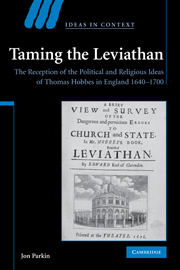 Taming the Leviathan
Taming the Leviathan Published online by Cambridge University Press: 05 May 2010
HOBBES AND THE PROTECTORATE
Thus far Leviathan had attracted suprisingly little public comment. The Royalists had attacked Hobbes after his defection, and the Presbyterians and Episcopalians had launched minor attacks on his theology and ecclesiology from the autumn of 1652 onwards, but this hardly amounted to a major campaign. The relative silence was such that in 1654 John Davies commented that ‘On this side of the sea, besides the dirt and slander cast on him in Sermons & private meetings, none hath put any thing in Print against him, but Mr Rosse.’ However all of this would soon change, and the reasons were political.
One of the most decisive political changes to affect the reception of Leviathan during the 1650s was the establishment of the Protectorate after the Nominated Assembly dissolved itself in December 1653. John Lambert's Instrument of Government envisaged the restitution of a triadic constitutional structure, with a Lord Protector, Council of State and Parliament. Cromwell's installation as Head of State was soon followed in the spring by implementation of religious reforms which created a tolerant national church along the lines proposed by John Owen's Humble proposals. If Hobbes's political and ecclesiastical vision was a rather uncomfortable fit with the republican and tolerationist agendas of the Commonwealth, Leviathan's absolutism and Erastianism were now highly relevant to the new political situation where Cromwell's authority was now publicly recognised and identified with a new settlement in the established church.
To save this book to your Kindle, first ensure [email protected] is added to your Approved Personal Document E-mail List under your Personal Document Settings on the Manage Your Content and Devices page of your Amazon account. Then enter the ‘name’ part of your Kindle email address below. Find out more about saving to your Kindle.
Note you can select to save to either the @free.kindle.com or @kindle.com variations. ‘@free.kindle.com’ emails are free but can only be saved to your device when it is connected to wi-fi. ‘@kindle.com’ emails can be delivered even when you are not connected to wi-fi, but note that service fees apply.
Find out more about the Kindle Personal Document Service.
To save content items to your account, please confirm that you agree to abide by our usage policies. If this is the first time you use this feature, you will be asked to authorise Cambridge Core to connect with your account. Find out more about saving content to Dropbox.
To save content items to your account, please confirm that you agree to abide by our usage policies. If this is the first time you use this feature, you will be asked to authorise Cambridge Core to connect with your account. Find out more about saving content to Google Drive.